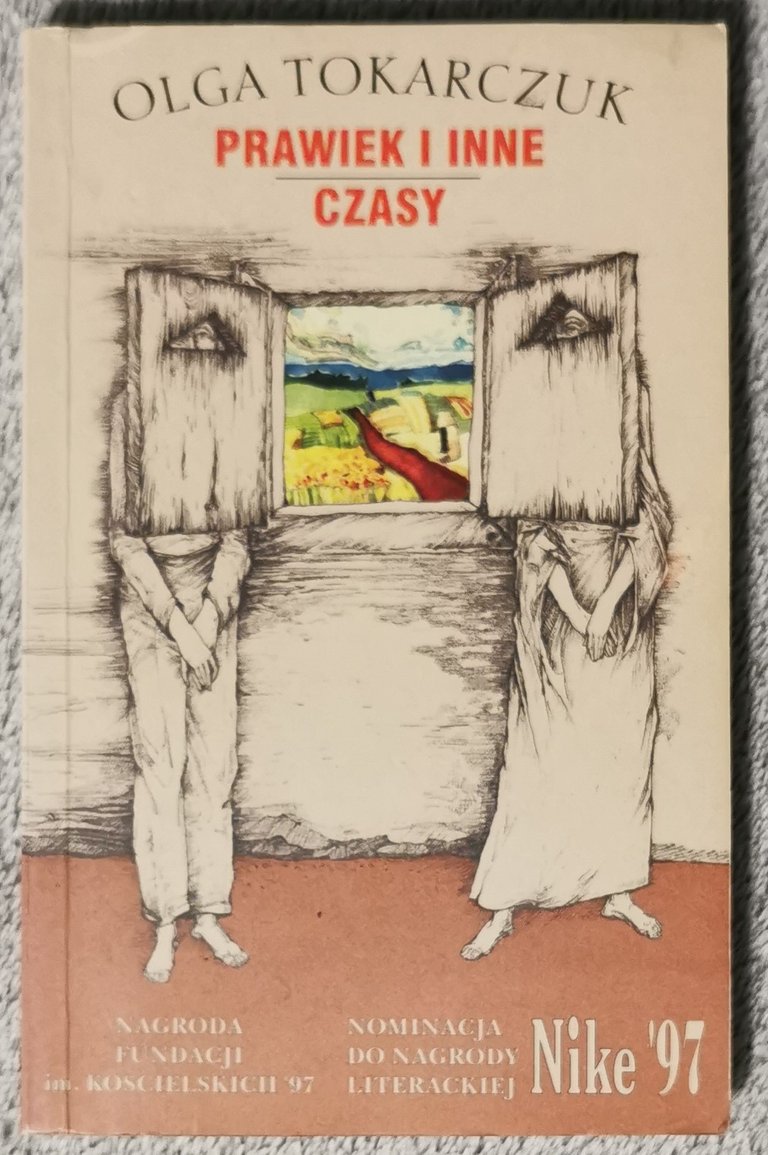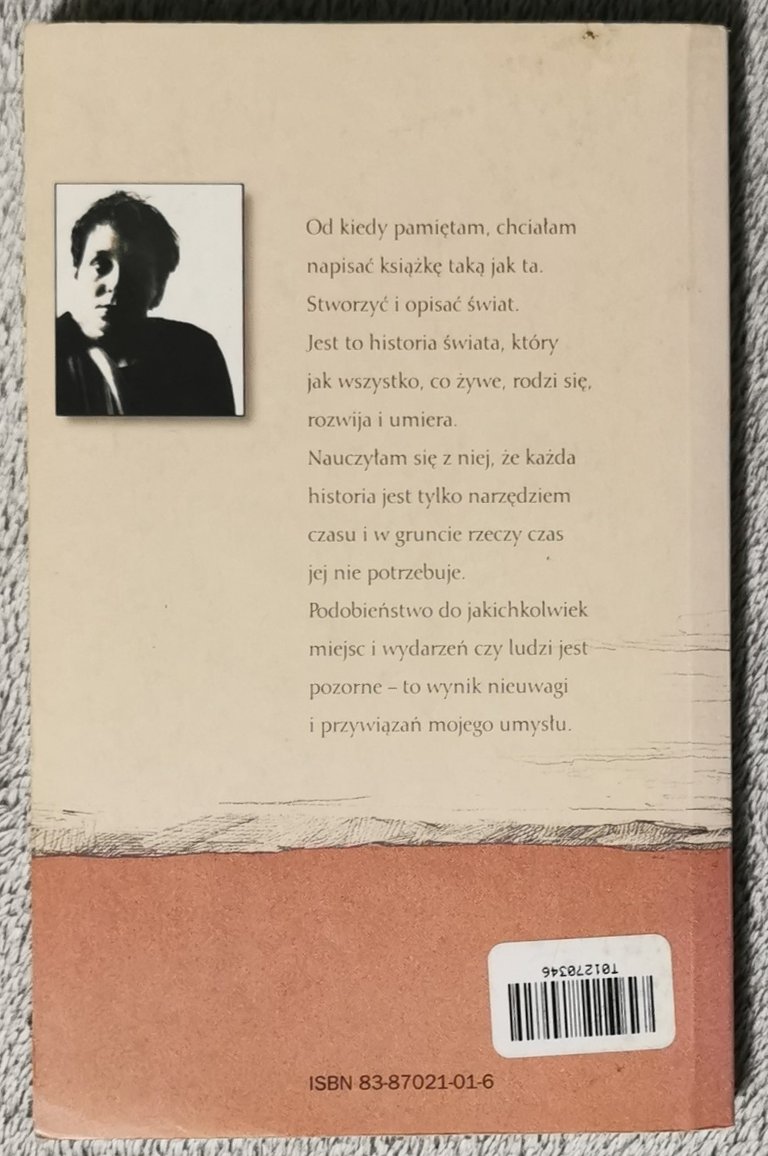[PL/ENG] Czytaj z Marcinem 23/2023 - "Prawiek i inne czasy", Olga Tokarczuk

| Do książek Olgi Tokarczuk, pomimo ich pozytywnego odbioru w kraju i za granicą, zabierałem się trochę jak pies do jeża – niby były gdzieś tam w planach do przeczytania, na liście oczekujących, ale jakoś nie byłem w stanie się do tego zmobilizować. Aż tu nagle się okazało, że do pracy trzeba. Znowu – po angielsku i po bułgarsku. Z tego względu na razie pominę wrażenia na temat języka autorki, bo częściowo mógł zostać zniekształcony przez tłumaczy. Ale co do samej treści, wrażeń z lektury – tym się chętnie podzielę. |
Despite the positive reception of Olga Tokarczuk's books at home and abroad, I approached them with trepidation - they seemed to be somewhere in my reading plans, on a waiting list, but somehow I was unable to mobilise myself to read them. Then, suddenly, they became necessary for work. Again - in English and in Bulgarian. For this reason, I'm going to leave out my impressions of the author's language, which may have been partly distorted by the translators. But as for the content itself, the impressions of the reading - I will be happy to share them. |
| Jako pierwszy w kolejce trafił mi się „Prawiek i inne czasy” – książka już dość stara, nominowana do nagrody Nike w 1997 roku. Niezbyt gruba – 269 stron, w formacie nieco mniejszym od zeszytowego. Podzielona na 84 krótkie rozdziały, opisujące fragmenty losów poszczególnych bohaterów. Konstrukcja dość oryginalna, nieczęsto spotykana. Nie przeszkadzała w lekturze, przeciwnie – wprowadzała do niej miłe urozmaicenie, choć muszę przyznać, że czasami, jeśli jedna postać pojawia się w rozdziałach oddalonych od siebie, można było troszkę zapomnieć szczegółów. |
First in the queue was "Primeval and Other Times" - a rather old book, nominated for the Nike Award in 1997. Not very thick - 269 pages, in a format slightly smaller than a notebook. Divided into 84 short chapters describing fragments of the fates of individual characters. A rather original structure, not very common. It did not hinder the reading, on the contrary, it added a nice variety to it, although I have to admit that sometimes, when a character appears in chapters far apart from each other, you could forget the details a little. |
| Bo samych postaci jest bardzo dużo – głównych, posiadających swoje wątki i rozdziały – ponad dwadzieścioro. Do tego swój czas (bo tak zatytułowany jest każdy rozdział: „Czas kogoś/czegoś”) mają też pewne miejsca i przedmioty. I te czasy się ze sobą przeplatają tak, jak wzajemnie powiązane ze sobą są poszczególne postaci, miejsca i przedmioty. |
That's because there are a lot of characters - more than twenty major ones with their own plots and chapters. On top of that, certain places and objects have their own time (because that's how each chapter is titled: 'The time of someone/something'). And these times are intertwined, just as the individual characters, places and objects are intertwined. |
| W tym miejscu warto byłoby w końcu określić, w jakim czasie i w jakim miejscu dzieją się opisywane wydarzenia. Jeśli chodzi o czas, jest to w miarę wykonalne – najgłębiej sięgające w przeszłość fragmenty dotyczą początków XX wieku, być może końca XIX-wieku: mówi o tym określenie „jeszcze przed wojną”, gdzie z kontekstu wiadomo, że chodzi o I wojnę światową. Najpóźniejsze natomiast to druga połowa XX wieku, co najmniej lata 70, a być może nawet początek lat 90 tuż po przemianach ustrojowych – w jednym z końcowych rozdziałów pojawiają się peweksy. |
At this point, it would be useful to specify the time and place in which the events described take place. As far as time is concerned, this is quite possible - the most far-reaching passages refer to the early twentieth century, perhaps the end of the nineteenth century: this is indicated by the phrase 'before the war', where it is clear from the context that the First World War is meant. The most recent are the second half of the twentieth century, at least the 1970s, maybe even the early 1990s, just after the political changes - as the Pewex shops appear in one of the last chapters. |
| Co się tyczy miejsca – sprawa jest trudniejsza, jest to typowe „wszędzie i nigdzie”. Tytułowy „Prawiek” – choć gdy się patrzy jedynie na okładkę książki, mógł być interpretowany dosłownie, jako bardzo daleka, zamierzchła przeszłość, okazuje się nazwą wsi, położonej gdzieś na Kielecczyźnie. Gdzie dokładnie – nie ma znaczenia, a i nie da się ustalić: opisane w książce sąsiednie wsie noszą nazwy rzeczywiście istniejące, jednak… prawdziwy Taszów leży na Dolnym Śląsku, tuż przy granicy z Czechami, Jeszkotle – na Opolszczyźnie, a Gościńców w kraju jest coś 65, z czego samodzielnymi wsiami są tylko dwa – jeden pod Radomiem, a drugi faktycznie niedaleko Kielc. |
As for the place - it is more difficult, it is a typical "everywhere and nowhere". The word 'Prawiek' in the title - which, looking at the book's cover alone, could be taken literally, as a very distant, ancient past - turns out to be the name of a village somewhere in the Kielce region. It doesn't matter where exactly, and it's even impossible to find out: the neighbouring villages described in the book have names that actually exist... the real Taszów is in Lower Silesia, right on the border with the Czech Republic, Jeszkotle - in the Opole region, and there are about 65 places called Gościniec in the country, of which only two are independent villages - one near Radom and the other actually near Kielce. |
| Niemniej nie jest to istotne dla samego utworu, którego celem było przedstawienie losów poszczególnych osób, całej społeczności oraz konkretnych miejsc – takich, jakich w całej Polsce było mnóstwo. I w tym sensie jest to powieść uniwersalna, w której każdy ma szansę odnaleźć coś z losów swoich, swojej rodziny, swoich przodków. |
However, this is irrelevant to the novel itself, the purpose of which was to depict the fate of individuals, the community as a whole, and specific places - such as there were in abundance all over Poland. And in this sense it is a universal novel, in which everyone has the chance to find something of their own destiny, of their family, of their ancestors. |
| A losy te były i są różne. Część została przedstawiona bardzo realistycznie, ze szczególnym uwzględnieniem czasów wojennych. Część zawiera elementy surrealistyczne i oniryczne – szczególnie czas Kłoski i scena, w której uprawia ona miłość z arcydzięglem przemienionym w roślinnego młodzieńca, czas Topielca Pluszcza albo czas dziedzica Popielskiego i jego Gry. Niemniej całość tworzy spójny obraz losów całej miejscowości oraz kilku rodzin ją zamieszkujących na przestrzeni tych blisko stu lat. |
And these destinies were and are different. Some of them are very realistic, with a particular focus on the war years. Some contain surreal and oneiric elements - notably the time of Cornspike and the scene in which she makes love to an angelica plant transformed into a young man, the time of the Dipper the Drowned Man, or the time of the squire Popielski and his Game. Nevertheless, the whole forms a coherent picture of the destiny of the entire village and the various families that inhabit it over the course of almost a hundred years. |
| Jeśli chodzi o wrażenia z lektury… Na pewno nie jest to książka, która spodoba się każdemu, ma swoją specyfikę – zarówno pod względem formy, jak i samych treści. Mnie samemu czytało się przyjemnie, a choć ogólnie nie przepadam za oniryzmem w literaturze, to jednak muszę przyznać, że tym razem nie raził mnie zbytnio. Uważam, że jest to lektura w sam raz na pierwsze zapoznanie się z twórczością polskiej noblistki – nie jest przekombinowana, a jednocześnie nie odstrasza rozmiarem. Biorąc pod uwagę całość własnych doświadczeń – polecam i daję 8 punktów. |
As for my impressions of the book... It is certainly not a book that will appeal to everyone, it has its own peculiarities, both in terms of form and content. I myself found it an enjoyable read, and although I'm generally not a fan of oneirism in literature, I have to admit that this time it didn't really bother me too much. In my opinion, it is a good introduction to the work of the Polish Nobel laureate - it is not overly complicated and at the same time does not intimidate with its size. Taking into account the totality of my own experience - I recommend it and give it 8 points. |

0
0
0.000
0 comments